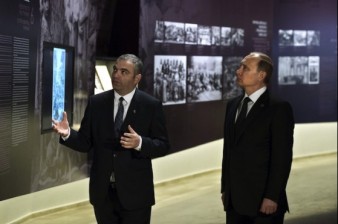
30/04/2015 10:42
Russia,Turkey Bicker over the G-Word
The Kremlin has tried to placate Turkish anger at Vladimir Putin terming as genocide the killing of an estimated one to 1.5 million ethnic Armenians in Turkey during World War I. Eurasia.net reports.
An an April 28 press-conference, Turkish President Recep Tayyip Erdoğan, never one to conceal his feelings, let loose: “It is not the first time Russia used the word genocide on this issue,” said Erdogan, adding that he was personally disappointed by Putin’s words. “What is happening in Ukraine is evident. They should first explain this before calling it [the 1915 slaughter] genocide.”
On April 24 itself, the centennial of the 1915 massacre, the Turkish foreign ministry had delivered a sharper punch, noting that “[t]aking into account the mass atrocities and exiles in the Caucasus, in Central Asia and in eastern Europe committed by Russia for a century, collective punishment methods (...) as well as inhumane practices especially against Turkish and Muslim people in Russia’s own history, we consider that Russia is best-suited to know what exactly ‘genocide’ and its legal dimension are.”
The Kremlin said nothing at first. But now that Erdoğan has shown he’s riled, it’s responded with a backhanded reminder to Turkey of where some of its interests lie.
Kremlin spokesperson Dmitry Peskov expressed a hope that the Turkish leader’s reaction “would not influence the relationship between Moscow and Ankara, and, above all, the Turkish Stream,” a 63-billion-cubic-meter-per-year pipeline that would carry Russian gas under the Black Sea to Turkish territory, and on to European markets.
“We have a lot to do together,” Peskov observed.
Turkish Energy Minister Taner Yıldız last week said that Putin’s comments had “surprised” him, but would not cause a rethink of an ambitious gas project with Russia, Hürriyet Daily News reported. Russia also supplies Turkey with an estimated 57 percent of its gas.
That could influence how this stand-off plays out. Turkey withdrew its ambassadors from the Vatican and Austria after the two states characterized the 1915 massacre as a genocide. The foreign ministry has strongly chastised German President Joachim Gauck for doing the same, but has held off on further moves while the German parliament mulls over the question of genocide-recognition.
But none of these states produce their own natural gas. Or export it in massive quantities to Turkey.
Russia, though, is unlikely to back-pedal publicly from Putin’s remarks. While many world leaders, including US President Barack Obama, shied away from using the one word that sets Armenian and Turkey worlds apart, for Moscow, it is a matter of both its past and present with Armenia.
The violence against ethnic Armenians in Ottoman Turkey erupted in big part over suspicions of their cooperation with fellow Christian Russia, a World-War-I enemy with an eye on Ottoman-held territory. Today, Armenia is a prime foothold for Russia south of the Caucasus Mountains and an eager participant in Moscow’s neo-USSR integration projects, such as the Eurasian Economic Union.
“We always were, are and will be close allies,” Putin said in Yerevan on April 24, with his presence at the centenary itself underscoring this point.








